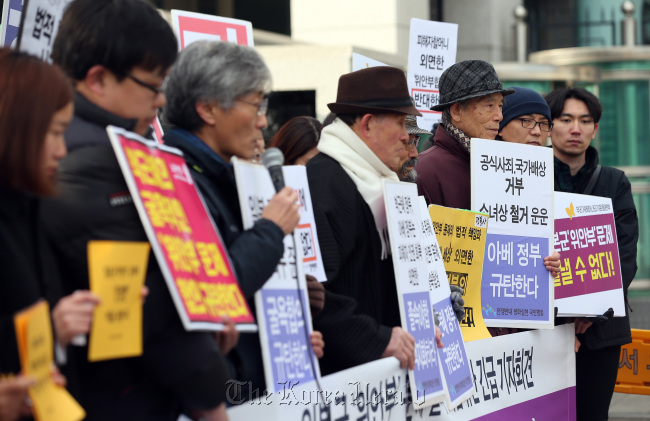Despite a much-touted breakthrough with Japan on sex slavery, criticism is simmering over Seoul’s apparently rushed negotiations that led to its failure to consult beforehand with the victims, leaving room for potential diplomatic blunders and political backlash at home.
Monday’s announcement came as a surprise to many because the bilateral director-general-level talks had made little headway during the 11 rounds since April 2014. Even early this month, diplomatic sources remained skeptical of their conclusion anytime soon, with some saying striking a satisfactory deal may be “inconceivable.”
Yet the mood began to turn around late last week after Japanese media churned out reports that Prime Minister Shinzo Abe instructed his Foreign Minister Fumio Kishida to travel to Seoul, a clear sign that the two countries were arranging ministerial talks and possibly a major announcement at a time when the sex slavery issue was the biggest stumbling block for their ties.
The sides soon released their plans for the 12th round of director-general-level talks Sunday, followed by a ministerial meeting Monday, during which Kishida and his Korean counterpart Yun Byung-se unveiled the agreement.
Though they extoled the deal as ushering in a “new era” for the relationship, a relay of hostile reactions from the former “comfort women” who were apparently not briefed in advance of the deal’s announcement instantly triggered views that Seoul may have hastily reached the settlement.
 |
|
Members of civic groups stage a demonstration in front of the government complex in central Seoul on Tuesday in protest against an agreement reached by Korea and Japan a day earlier to resolve their wartime sex slavery dispute. (Yonhap) |
This year’s 50th anniversary of the countries’ relations aside, officials did point to some recent developments as tacit catalysts to the talks: A Seoul court on Dec. 17 cleared a reporter of an ultra-right Japanese daily who wrote a negative story about President Park Geun-hye of defamation charges, while Korea’s Constitutional Court last Wednesday rejected a review on a petition over the constitutionality of the 1965 treaty that normalized relations between the two countries.
But questions persist over their failure to discuss the agreement with the victims and inform them earlier of the results of the months-long negotiations. With the women demanding Tokyo’s official apology and compensation, Yun, chief negotiator Lee Sang-deok and other ranking officials here have long been stressing that any agreement will have to be “acceptable to the victims and deemed reasonable by the public.”
In an apparent attempt to soothe their sentiment, vice foreign ministers belatedly visited the victims Tuesday at the Korean Council for the Women Drafted for Military Sexual Slavery by Japan and the House of Sharing, a shelter in Gwangju, Gyeonggi Province.
Foreign Ministry officials refused to address the question during a regular press briefing and informal meetings with reporters.
“While the agreement is subject to the judgment of the victims and the public, the ministry could not have been able to speak on the negotiations with them because of high risks involving a potential leak and a resulting breach of diplomatic protocol and, in a worse scenario, the loss of the upper hand,” a diplomatic source said, requesting anonymity due to the sensitivity of the matter.
Another source said: “If they were to visit the victims, the minister should have done it himself, perhaps alongside a presidential foreign and security affairs secretary. … It seemed they did rush without having a thorough strategy in the face of the ever-growing U.S. pressure to improve the relationship.”
By Shin Hyon-hee (heeshin@heraldcorp.com)

